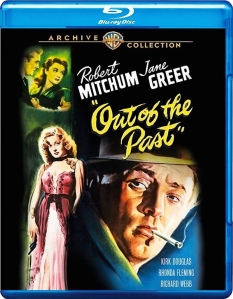 In Jacques Tourneur’s Out of the Past (1947), Jeff Bailey (Robert Mitchum) falls in love with two women who represent two forms of love: Ann Miller (Virginia Huston) is a woman of virtue, a lifelong companion and friend, while Kathie Moffat (Jane Greer), the femme fatale, is a passionate and seductive lover.
In Jacques Tourneur’s Out of the Past (1947), Jeff Bailey (Robert Mitchum) falls in love with two women who represent two forms of love: Ann Miller (Virginia Huston) is a woman of virtue, a lifelong companion and friend, while Kathie Moffat (Jane Greer), the femme fatale, is a passionate and seductive lover.
Driven by self-preservation and a desire for revenge, Kathie is a liar, a thief, and a killer. Her dark nature is first revealed when Jeff tells her that Whit Sterling (Kirk Douglas) is alive, and she coldly replies, “I hate him. I’m sorry he didn’t die.” Kathie stole $40,000 from Whit, tried to murder him, and feels no guilt or remorse. According to Jack Boozer, “The lethal seductress … largely abjures traditional romance and passive domesticity, choosing instead to apply her sexuality to homicidal plots in the service of greed.”1 Kathie fits this definition. Despite her dark nature, Jeff and Whit cannot resist her alluring nature.
In contrast to Kathie, Ann is a woman of virtue—innocent, trusting, and loving. In her first scene, she sits with Jeff by the lake, looking at the clouds. As Jeff muses about marrying her, she says, “I wish you would.” Ann is faithfully devoted to Jeff and will never abandon him. At the film’s midpoint, when he is wanted for two murders, she retreats again to nature, sitting by a stream in quiet contemplation, refusing to believe that he is guilty. Ann’s connection with nature reveals her virtue and innocence. She uncontaminated by the dark urban world of Jeff’s past.
While most of Anne’s scenes are in daylight, Kathie is a creature of the night. After Jeff kisses her on the moon-lit beach, she only appears at night until the day they leave Mexico. Later, when Jeff re-unites with her at a cabin in the country, he says, “Then I saw her walking up the road in the headlights.” However, this light is not the natural light of the Sun or Moon; it is man-made and artificial, reflecting Kathie’s artificial character. Unlike Ann who is never false, Kathie is never fully honest with Jeff, often lying or concealing the truth from him.
Ann is at peace in the natural world, but Kathy is a violent and unpredictable force of nature. When Jeff first sees her, he says in awe, “I saw her coming out of the Sun.” Kathie is like a comet, dazzling Jeff with her alluring beauty. The next time he sees her, he says, “She waited until it was late, and then she walked in out of the moonlight, smiling.” These juxtaposing scenes—one in the Sunlight, the other in moonlight—reveal the extremes of Kathie’s character. Although she is beautiful, she is a creature of darkness, capable of love, but poisoned by hate.
Kathie and Ann represent two forms of love and light. Ann is a heavenly creature: an angel of light. Kathie is a false and deceptive light, putting Jeff and Whit under a sexual spell. Ann loves Jeff unconditionally, but Kathie’s love is conditional. In the climax of the film, after Whit threatens her and Jeff betrays her to the police, both men are shot dead by the femme fatale.
Notes
- Jack Boozer, “The Lethal Femme Fatale in the Noir Tradition,” Journal of Film and Video 51, no. 3-4 (1999-2000): 20, http://www.jstor.org/stable/20688218
Thanks, Janet. This is one of my favourite film noir. It is out on Blu ray now as well.
LikeLike
I watch this film and then the commentary by James Ursini at least twice a year.
Every time, I yearn to know Kathie’s backstory. I imagine her as a poor Depression-era child and teen moving around a lot with her family or between family members and perhaps dodging a step-father or two. She learned how to manipulate situations immediately because she only knew conditional love and support.
LikeLiked by 1 person
What an interesting comparison!
LikeLiked by 1 person
Thanks for sharing your great reflections! To me, it is the complete unpredictability and constantly changing morals of Kathie that make her so dangerous. In my field of study, we look at the relevance of remorse and its importance to transformation and reconciliation… I believe we give remorse way more relevance than what it actually should have!
LikeLiked by 1 person
Thank you for your kind comment and insights on the film. It is one of the greatest film noirs of all time.
LikeLike
I really like how you drew out the contrasts between the two women in the area of the sunlight and moonlight and also the nature vs. urban settings. I think that the film did a great job subtly building the femme fatale throughout the movie until the final climax. I also found it quite interesting that the death of Jeff Bailey is not the only consequence (and perhaps not even the worst) of the femme fatale’s actions, as Ann ultimately doubts Jeff’s sincerity towards her after his death. It is not just the death of our main character, but it is his holistic defeat that makes this film utterly noir.
Good review.
-Anderson Ryle
LikeLiked by 1 person
One of my favorite film noir. I love Mitchum, he had a great career and has done some great films noir that I love. Nice review.
LikeLiked by 1 person
Thanks for the kind comments about my review of the same movie. I likewise enjoyed your take on *Out of the Past.* Be of good cheer. . .
LikeLiked by 1 person
I enjoyed your insightful analysis!!
LikeLiked by 1 person